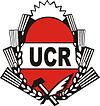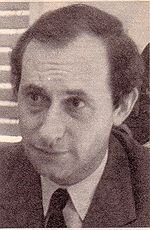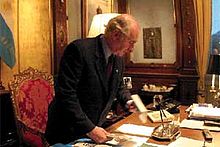- Fernando de la Rúa
-
Fernando de la Rúa File:Fernando de la Rúa /con bastón y banda de presidente.jpg 51st President of Argentina In office
December 10, 1999 – December 21, 2001Vice President Carlos Álvarez (1999-2000)
None (2000-2001)Preceded by Carlos Menem Succeeded by Adolfo Rodríguez Saá 1st Chief of Government of Buenos Aires In office
August 6, 1996 – December 10, 1999President Carlos Menem Preceded by Jorge Domínguez Succeeded by Enrique Olivera Personal details Born September 15, 1937
CórdobaNationality Argentine Political party Radical Civic Union/Alliance Spouse(s) Inés Pertiné Profession Lawyer Signature 
Fernando de la Rúa (born September 15, 1937) is an Argentine politician. He was president of the country from December 10, 1999 to December 21, 2001 for the Alliance for Work, Justice and Education (a political alliance of the Radical Civic Union and Frepaso).
Contents
Biography
Early life
Born to Eleonora Bruno and Antonio De la Rúa in the city of Córdoba, he attended the local Military Lyceum before entering the National University of Córdoba, from which he obtained his law degree. The son of a judge and longtime supporter of the centrist Radical Civic Union (UCR), de la Rúa became involved in politics at a young age, and entered public service in 1963 as an advisor to President Arturo Illia's Internal Affairs Minister. He married the former Inés Pertiné, a Buenos Aires socialite, in 1970, and had three children, including Antonio de la Rúa, an entrepreneur who was engaged to pop superstar Shakira.
He first appeared in the national political arena in 1973, when he was elected to the Argentine Senate, representing the city of Buenos Aires. A few months later he ran for the Vice Presidency as veteran UCR politician Ricardo Balbín's running mate in snap elections called for September of that year; their ticket was defeated by the recently returned populist leader, Juan Perón, in a landslide. His youth (running for Vice President at the age of 36) earned him the still-standing nickname of "chupete" ('pacifier' or 'dummy'), as he was perceived as a political neophyte.[1]
He taught criminal law at the University of Buenos Aires after the March 1976 coup that suspended Congress,[2] and wrote four books on legal theory. Following the democratic restoration in 1983, in which the UCR prevailed, de la Rúa was overwhelmingly returned to the Senate. His 1989 reelection bid was complicated by an economic crisis that affected all UCR candidates, however, and although he won the popular vote, de la Rúa was outmaneuvered in the Electoral College by an alliance between the Justicialist Party and the Ucedé.[3]
Elected to the Lower House by his constituents in the city of Buenos Aires in 1991, he was again returned to the Senate in a 1992 special election, and de la Rúa became increasingly thought of as presidential timber in the press.[4] Benefiting from his high standing in the polls and the amendments to the Constitution that gave Buenos Aires the right to elect its own mayor, de la Rúa became the first elected mayor of Buenos Aires following elections on June 30, 1996.
Quick to tackle chronic property tax evasion in his city, de la Rúa earned a reputation for efficiency as his city's mayor. President Carlos Menem's dismissal of the Alliance candidate as "boring" was effectively used by the de la Rúa campaign in their ads, by which de la Rúa's tedium became a desirable alternative to Menem's "party" (a reference to the latter administration's numerous corruption scandals).[1] This, as well as the nation's mounting social and economic problems, helped carry de la Rúa to victory in the October 24, 1999, presidential election, handily defeating the ruling party candidate, Buenos Aires Governor Eduardo Duhalde (despite the latter's opposition to the unpopular president). Fernando de la Rúa was inaugurated President of Argentina on December 10, 1999.
Presidency
De la Rúa's government inherited an ongoing economic crisis. His administration initially announced increases in infrastructure spending and teacher pay (the subject of a "white tent" protest on Congressional Plaza from 1997 to 1999) and established educ.ar ("educate"), a state-sponsored educational website. Enjoying high approval ratings in its early days, continuous disputes and rivalries among the coalition partners, a general sensation of inaction in the face of recession, and a failure to tackle corruption, as well as de la Rúa's own lack of charisma and slow demeanor (perceived as stupor), hurt his public image.[5] The July 29 suicide of Dr. René Favaloro, the creator of coronary bypass surgery, following repeated, unsuccessful attempts to obtain federal reimbursement for millions in services, underscored public perceptions of an inability to govern, moreover.[6] Subsequent revelations that the administration bribed a number of UCR senators for their support of a stalled labor law flexibilization bill in April led to the resignation of Vice President Álvarez in protest on October 6, as well as of Cabinet Chief Rodolfo Terragno and of three other cabinet members, pushing the de la Rúa presidency into its crisis stage.[7]
Economy Minister José Luis Machinea enacted austerity measures,[8] and successfully negotiated a US$38 billion International Monetary Fund line of credit in December.[9] A worsening recession and disapproval of cutbacks led to Machinea's resignation on March 5, followed two weeks later by that of his conservative successor, Ricardo López Murphy. Facing mounting pressure and 18% approval ratings,[10] on March 19, 2001, the president reached out to Domingo Cavallo, the economist behind the "Argentine miracle" during the early 1990s. Cavallo's appointment was, however, interpreted as an act of desperation by the derivatives markets and a massive shorting of Argentine bonds ensued, followed by at least US$40 billion in domestic capital flight.[11]
Deep budget cuts, including a 13% reduction in pay for the nation's 2 million public sector employees, failed to curb the rapidly increasing country risk on almost U$100 billion in Argentine bonds, increasing debt service costs and further limiting access to international credit, despite a moderately successful debt swap arranged by Cavallo with most bondholders. Voters reacted to the rapidly worsening economy in the October 2001 midterm elections by both depriving the Alliance of its majority in the Lower House, and by casting a record 25% of spoiled ballots.[10]
The financial crisis and the wave of capital flight led Cavallo to impose a limited account freeze on cash withdrawals on December 1, and four days later, the IMF, IADB and World Bank announced the cancellation of loan tranches of over US$5 billion.[12] The withdrawal limits led to growing popular unrest, moreover, and by mid-December, rioting had begun in a number of poorer urban neighborhoods. Amid repression of protesters and rioters that left 23 dead, one of the president's last acts in office was to ban extraditions for human rights violations.[13] De la Rúa was ultimately forced out of office, however, by the December 2001 riots, which took shape under the rallying cry, ¡Que se vayan todos! ("Away with them all!") – referring to the governing and political class.
Later life
De la Rúa was hounded by numerous charges and lawsuits in subsequent years, both relating to police repression during the riots,[14][15] as well as for his role in the Senate bribery case,[16] and for alleged irregularities in the 2001 debt swap.[17] He was indicted for homicide by Judge Claudio Bonadío in March 2007, though the ruling was reversed a year later. Accusations by Security Minister Enrique Mathov and Internal Affairs Minister Ramón Mestre the president had ordered demonstrators at the Plaza de Mayo (in which five died) quelled were ruled unsubstantiable by Judge Bonadío in April 2009.[15]
References
- ^ a b New York Times (September 26, 1999) (Spanish)
- ^ International Who's Who. 2004. Europa Publications, 2003.
- ^ Página/12. Parábola de Fernando. (Spanish)
- ^ Noticias, September 6, 1991.
- ^ "Little sympathy for Argentine president", BBC News, 17 March 2001
- ^ New York Times (August 7, 2000)
- ^ Clarín (October 7, 2000) (Spanish)
- ^ Clarín (May 29, 2000) (Spanish)
- ^ Periodismo. De la Rúa anuncia hoy el blindaje financiero. (Spanish)
- ^ a b BBC News
- ^ Univ. of Pittsburgh study
- ^ Clarín December 6, 2001) (Spanish)
- ^ World Briefing | Americas: Argentina: Human Rights Extraditions The New York Times, December 25, 2001
- ^ Es Más (March 8, 2002) (Spanish)
- ^ a b Clarín (April 8, 2009) (Spanish)
- ^ La Nación (February 26, 2008) (Spanish)
- ^ Clarín (July 10, 2006) (Spanish)
Political offices Preceded by
Carlos MenemPresident of Argentina
1999–2001Succeeded by
Adolfo Rodríguez SaáPreceded by
(none)Chief of Government of Buenos Aires
1996–1999Succeeded by
Enrique OliveraHeads of state of Argentina May Revolution and Independence War Period
up to Asamblea del Año XIII (1810–1814)Supreme Directors of the United Provinces
of the Río de la Plata (1814–1820)Unitarian Republic – First Presidential Government (1826–1827) Pacto Federal and Argentine Confederation (1827–1862) National Organization – Argentine Republic (1862–1880) Generation of '80 – Oligarchic Republic (1880–1916) First Radical Civic Union terms,
after Universal (Male) Suffrage (1916–1930)Infamous Decade (1930–1943) Revolution of '43 military dictatorships (1943–1946) First Peronist terms (1946–1955) Revolución Libertadora military dictatorships (1955–1958) Fragile civilian governments – Proscription of Peronism (1958–1966) Revolución Argentina military dictatorships (1966–1973) Return of Perón (1973–1976) National Reorganization Process military dictatorships (1976–1983) Return to Democracy (1983–present) Raúl Ricardo Alfonsín · Carlos Saúl Menem · Fernando de la Rúa · Adolfo Rodríguez Saá · Eduardo Duhalde · Néstor Kirchner · Cristina Fernández de KirchnerRelated parties or alliances 
Radical presidents of Argentina Hipólito Yrigoyen • Marcelo Torcuato de Alvear • Arturo Frondizi • Arturo Umberto Illia • Raúl Alfonsín • Fernando de la RúaOther Radicals Leandro N. Alem • Arturo Jauretche • Ricardo Balbín • Eduardo Angeloz • Rodolfo Terragno • Julio Cobos • Ricardo AlfonsínKey events Revolution of the Park • 1916-1930 period • Trial of the JuntasCategories:- 1937 births
- Living people
- People from Córdoba, Argentina (city)
- Argentine people of Spanish descent
- University of Córdoba alumni
- Argentine lawyers
- Argentine academics
- Radical Civic Union politicians
- Members of the Argentine Senate
- Members of the Argentine Chamber of Deputies
- Mayors of Buenos Aires
- Presidents of Argentina
Wikimedia Foundation. 2010.


